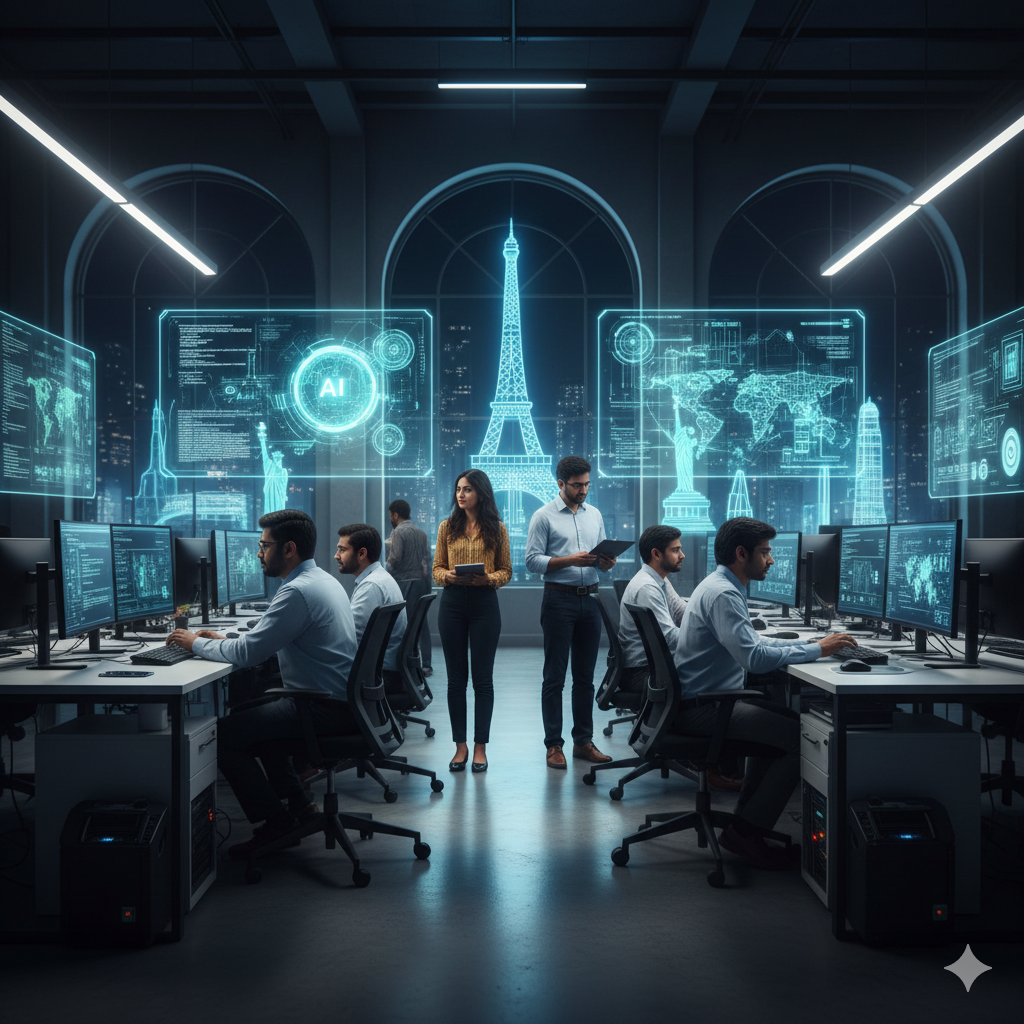AI has transitioned from an opportunistic trend into a strategic, competitive enabler for organizations of all sizes. According to McKinsey, in 2024, nearly 71% of all organizations leveraged Generative AI in at least one key business function. In fact, enterprises are investing heavily in building new Agentic AI systems with capabilities that far exceed those demonstrated by Gen AI.
From streamlining operations to enhancing customer experience, AI finds use in almost every quadrant of business growth. But not everything is a bright spot for AI investments. Growing AI capabilities at scale can often be a major challenge. Studies show that nearly 74% of enterprises struggle when it comes to deriving actual value at scale from AI investments they make. Most decision-makers feel that the lack of appropriate talent at their disposal is the primary culprit. But in reality, the core issue is not talent but the inability to nurture an AI mindset.
Navigating the AI journey is about the right mindset
Generating meaningful value from AI stems from an inherent passion to use technology in driving fundamental changes across the business. This would mean having a mindset of becoming a truly AI-enabled organization wherein AI capabilities are strategically developed from within the heart of the business, rather than going for quick wins by buying an AI software to assist in new opportunities or use cases.
Any organization can claim to be AI-powered when at least one of its customer or employee functions is complemented with an AI tool. But an AI-enabled organization will be driven by a mindset of truly understanding the transformative impact of AI and how it can be a competitive advantage and strategic growth engine. Decision-makers need to have a clear idea of how to foster an AI-first mindset to future-proof business growth sustainably.
4 tips to grow an AI-first mindset in your organization
Defining the mindset
The first step in the journey is to accurately plan and define the most tailored mindset needed for the business to leverage AI in the best way possible. The cultural change needed across levels, ranging from the junior-most employee or new recruits to the senior leadership, must be planned. For the leaders, the cultural change needed would be a shift in focus to improve strategic value creation from AI investments. As for employees reporting to them, the key focus should be on eliminating the fear of AI replacing them and instead instilling confidence and empowering them to leverage AI as a true work buddy.
Rather than going in for a fully-fledged cultural change, it is important to evaluate the existing work culture and identify areas that can adapt more easily to AI initiatives and then use them as a foundation to build change across the larger operational landscape.
Create awareness
Once the right mindset is in place, the next stage is helping create awareness amongst stakeholders. This can be done through holistic internal campaigns that showcase the benefits of implementing AI-oriented changes in the business’s operations. Breaking down the organizational benefits to individual strengths will help create excitement for all stakeholders to hop on board the change initiative.
The exercise should also involve closer interactions with industry experts to ensure that employees are well aware of the trends happening across the larger spectrum of things.
Continuous training and learning exercises
The digital skills needed to usher in new AI experiences across the entire business spectrum should be publicized, and learning initiatives deployed to help people acquaint themselves with the desired knowledge. Empowering them with knowledge on how AI capabilities can be broken down into smaller routines, which can be implemented across their daily work cycles, will foster better adoption. Additionally, incentivizing people to gain AI skills will help in promoting deeper adoption of AI into more organizational workstreams. Early learners and adopters must be encouraged to become champions of change by driving key learning initiatives, and rewarding them will motivate others to join the change.
Freedom to experiment
It is essential to equip employees with the confidence to pursue risky experiments to build new AI capabilities. Providing them the necessary resources like innovation budgets, software, and hardware support, external guidance, etc., will ensure that employees think out of the box.
Innovation and freedom to experiment are key traits that help accelerate AI adoption across the organization. It will also motivate existing talent to seek upskilling avenues to support aspirational projects, as the organization has a safety net that allows them to innovate without fear.
Winning the AI game with the right mindset
While search engines like Google still command a formidable presence in the field of information access, the onslaught of GenAI has empowered internet users to have a more direct and conversational workflow in their quest to gain knowledge. A search engine provides a list of options from which users need to further explore and find answers to questions. An LLM-powered GenAI tool like ChatGPT does the searching and sorting part on its own and provides direct answers to users. There is a fundamental shift in the way consumers are leveraging AI. There is a gradual mindset change happening among them as well. On a similar scale, organizations must embrace an AI-driven mindset to uncover meaningful value from their ventures in AI.
The change of mindset is not easy. Embracing a cultural and operational change requires strategic guidance, the right foundation for data, processes, and people, the selection of the right models, tools, and platforms, and above all, clear visibility into competitive benefits. This is where a technology partner like Wissen can be a major asset. Find out how we can help nurture the most value-driven AI mindset in your business and help bring about fundamental changes at the grassroots level to generate more value from AI investments.
FAQs
What is an AI-first mindset?
It is a cultural paradigm that focuses on orienting all organizational activities towards the goal of building AI capabilities from within the very foundation onwards.
Should AI talent be hired or cultivated?
Yes, organizations need to focus on creating an AI mindset rather than always hiring AI talent always because AI is a strategic business enabler that every stakeholder must be aware of.
Is an AI Mindset necessary for all employees?
Yes, every employee, ranging from the CEO to the junior-most employees, must understand the real benefits of adapting AI for achieving their individual career and business goals.



%20Will%20Future-Proof%20Your%20Business%20.jpg)








